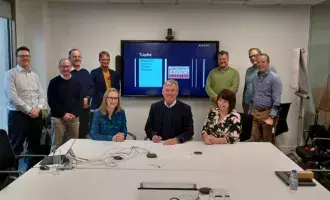So often, this crucial aspect of HR picks up employees once they’re already some time into their work for you – but actually the starting gun for employee engagement fires during the recruitment and onboarding phase of someone’s career.
It’s at this point that hopes are made and expectations are set, and the benchmark for the organisation’s culture and values is experienced as reality or fantasy. So if you want to keep people engaged, motivated and highly driven, your employee engagement specialists need to start building a journey from the moment a job offer is accepted. This moment is when people are most enthusiastic about the opportunity to work with you; you can’t afford to let that excitement drop.
This is especially true in a post-pandemic world. First week lunches, in-person initiation meetings and after-work drinks are a thing of the past. Starting a new job without any ‘real life’ interaction is a very different experience; spontaneity isn’t going to make up for a lack of planning. You need to actively build the opportunity to develop meaningful communications into your process, not expect it to happen by magic.
Bringing together all aspects of your business will be essential to getting those first few weeks just right for new joiners – gaps in contact will be where your approach falls down. Having the right technology, which guides relevant stakeholders’ participation and aligns new employees with the right contacts, is a true game changer, linking resourcing, learning, communications and engagement into a consistent experience. It can provide them with invites to helpful groups and meetings and essential learning and resources, and removes obstacles to a truly welcoming onboarding experience.
Human interaction, however, has never been more highly valued – or necessary. In 2020, wellbeing is no longer a fad; it has become an essential conversation point. What we all need is empathetic leadership, which is less short-term performance-focused and more long-term goal-orientated. Your employee assistance programme shouldn’t be relegated to the end of your employee handbook: it should be front and centre, from day one.
HR business leaders are taking this seriously, with improving the employee experience important to 88% of HR practitioners around the world1. Competitors that provide a better journey could very easily steal vital talent away. L’Oréal is one business that has taken huge steps during the pandemic2, including a new dedicated learning programme and using AI to recruit and interview employees. It has achieved a 95% satisfaction rate among candidates using a bot for early stage recruiting.
The easiest thing, right now, is to let people get on with it, and assume that they’re fine. But as we all know, from either personal experience or conversations with friends and family, many people have not been especially fine this year. Isolation and loneliness are widespread; reported feelings of depression have rocketed3. Those of us who came back into physical workplaces as lockdown eased over the summer were packed off home a few weeks ago. Uncertainty is still a powerful force. HR leaders are anticipating a “new burnout… driven by fear of job losses; an inevitable blurring of work / life balance; isolation; workplace suitability and adequate and reliable technology4”.
Many team members, existing as well as new, will be sitting at home alone for most of their work with you. Others may be juggling parenting and the responsibility of caring for elderly parents. The only glimpse line managers will get of their lives is going to be through a webcam, probably for an hour at a time. They may be worried and stressed by the financial impact of being furloughed or of losing their previous position, and are likely to be feeling a lack of support in this area from their employers. All this is ideally dealt with from the moment of hire, rather than waiting for anxieties and fears to develop.
There’s a real opportunity to begin a hopefully long and fruitful journey with your organisation, starting with building an empathetic, understanding and personal relationship. Onboarding is where this all begins, and it is the ideal position from which to drive positive engagement throughout an employee’s career.
Five key questions every recruitment leader needs to ask:
- Is my onboarding process providing a seamless journey for our candidates from contract to completing the first year?
- Are my new joiners directed automatically to all the resources and learning they need to complete their role?
- Is my talent automatically invited to the relevant networking and social groups?
- Are those working remotely being directed to our wellbeing programmes to ensure that they have the support they need?
- Does my onboarding technology enable me to take sentiment checks and pulse surveys to ensure that all stages of joining are working well?

Lesley Gregory
Product Manager for Digital Onboarding
Lesley has an extensive background in leading large talent acquisition teams in complex environments (BBC, Capita, Infosys) to deliver new joiners to start, equipped and ready to support their organisation’s business needs. Using a long- term interest in technology, data and insight to drive transformation initiatives and improve outcomes has led to a passion for creating solutions that not only streamline processes but add value and uplift user experience. She regularly contributes her thought leadership on these and allied topics.
How can we help your organisation?
(1) https://www2.deloitte.com/content/dam/insights/us/articles/5136_HC-Trends-2019/DI_HC-Trends-2019.pdf
(2) https://www.loreal.com/en/news/science-and-technology/research-innovation/using-artificial-intelligence-in-order-to-help-candidates-experience/
(3) https://www.ons.gov.uk/peoplepopulationandcommunity/wellbeing/articles/coronavirusanddepressioninadultsgreatbritain/june2020
(4) https://www.hrzone.com/lead/change/how-covid-19-will-impact-employee-wellbeing-in-the-long-term







